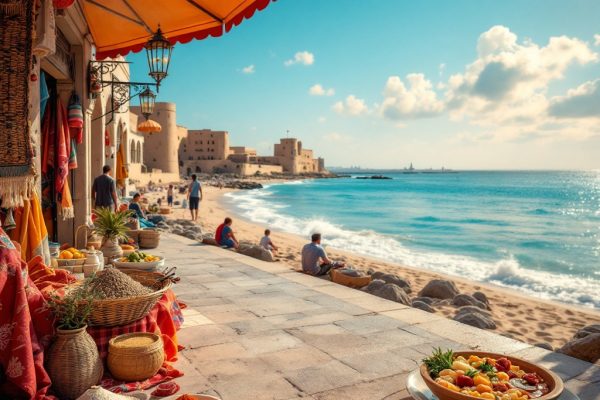The Future of Sustainability in Business Travel: Innovations and Best Practices
Want to boost your bottom line while saving the planet? Sustainable business travel is no longer a trend, but a core business value. Discover how eco-conscious travel policies, AI-powered itineraries, and carbon-neutral accommodations can enhance your CSR profile, attract customers, and even cut costs. Explore the future of business travel and learn how to implement sustainable practices today!
Important information

- Sustainability is becoming a core value in business travel, impacting travel policies and company practices.
- Technology like virtual meetings, AI-powered itineraries, and carbon emission tracking apps are key to reducing the environmental impact of business travel.
- The hospitality industry is adopting sustainable practices, including using renewable energy, reducing waste, and conserving water.
- Companies are encouraged to establish clear sustainability guidelines, train employees, and monitor their travel’s environmental impact.
- Emerging trends like regenerative tourism and digital nomad visas offer new opportunities for sustainable travel and longer stays, benefiting both travelers and local communities.
The Future of Sustainability in Business Travel
The business travel landscape is evolving, with sustainability taking center stage. Companies are actively offsetting their carbon footprint and implementing eco-friendly travel policies. The rise of virtual meetings is further lessening environmental impact, prompting a reevaluation of the necessity of in-person trips. Increasingly, organizations recognize that prioritizing sustainability benefits both the planet and their bottom line. Eco-conscious travel is no longer a niche trend but a core business value.
Importance of Sustainable Business Travel
Sustainable business travel significantly reduces environmental impact by minimizing CO2 emissions and resource consumption. Companies are increasingly adopting eco-friendly travel and accommodation options, recognizing the importance of sustainability for both the planet and their business. This green approach enhances their corporate social responsibility (CSR) profile, while also offering financial savings and strengthening brand image. Furthermore, it attracts environmentally conscious customers and improves stakeholder relationships, creating a mutually beneficial situation for all. Here’s how sustainable business travel benefits your company:
Environmental Benefits
- Reduces your company’s carbon footprint.
- Minimizes resource depletion.
- Supports eco-friendly initiatives.
Business Advantages
- Enhances your CSR profile.
- Attracts environmentally conscious customers.
- Improves stakeholder relationships.
- Offers cost savings on travel.
- Strengthens your brand image.
Current Challenges and Opportunities
Business travel, while essential, impacts the environment. Technology offers solutions like virtual meetings, often replacing physical trips. Evaluating each trip’s necessity minimizes environmental impact. The travel industry faces challenges: higher costs for sustainable options and unclear information about their benefits. However, 89% of businesses prioritize sustainability, with 76% integrating it into travel policies. This shows growing corporate dedication to responsible travel, balancing business needs with environmental care.
Innovations in Sustainable Business Travel
Technology is revolutionizing sustainable business travel, offering solutions to minimize environmental impact and maximize efficiency. Virtual meetings decrease the need for physical trips. Apps track carbon emissions to inform travel decisions. AI optimizes routes and suggests eco-friendly options, empowering companies and employees to adopt greener practices.
AI and Personalized Business Travel
AI is personalizing business travel. AI-powered platforms craft itineraries with greener options like electric vehicles or train travel, providing real-time emissions data so travelers can make sustainable choices. These platforms enhance the travel experience with personalized recommendations, promoting local businesses and mitigating the impact of mass tourism.
The Hospitality Industry Embraces Sustainability
The hospitality industry is embracing sustainability. Hotels are implementing eco-friendly initiatives such as using renewable energy and reducing water consumption. Some are even achieving carbon neutrality by offsetting their emissions. These initiatives not only lessen the environmental footprint of travel but also provide travelers with sustainable options, encouraging responsible choices.
Technology’s Role in Facilitating Sustainability
Technology plays a vital role in sustainable business travel by enabling eco-conscious decisions and enhancing travel policies. Booking platforms empower businesses to assess the environmental impact of flights and monitor carbon emissions. Around 70% of companies now use booking tools with these green features.
Virtual Meetings
Virtual meetings significantly contribute to reducing greenhouse gases. The COVID-19 pandemic highlighted their effectiveness in minimizing the carbon footprint compared to in-person meetings.
Balancing Act
Businesses now strive to balance virtual and physical meetings to maximize efficiency and minimize their environmental impact.
AI-Powered Itineraries and Personalized Travel Experiences
AI-powered tools craft personalized itineraries by considering traveler preferences and sustainability goals, helping reduce each traveler’s carbon footprint. Beyond personalization, AI enhances travel planning by automating tasks and optimizing routes for more efficient, eco-friendly trips. For example, AI empowers travelers to make informed choices about transportation, lodging, and activities. Moreover, AI contributes to sustainable business travel by simplifying the selection of greener options. While AI provides these powerful tools for better decision-making, travelers must still be mindful of their environmental impact.
Carbon-Neutral Accommodations and Eco-Friendly Initiatives
Many hotels are going green by becoming carbon neutral. They are implementing eco-friendly practices to significantly reduce their environmental footprint. Here’s how they’re making a difference:
Energy Efficiency
Hotels are boosting energy efficiency by utilizing LED lighting, smart thermostats, and energy-efficient appliances, thus minimizing energy consumption.
Renewable Energy
They are investing in renewable energy sources such as solar panels and wind power to reduce reliance on fossil fuels and generate clean energy.
Waste Reduction
Hotels are actively reducing waste through comprehensive recycling programs, composting food waste, and minimizing the use of single-use plastics.
Water Conservation
Water conservation is a priority, with hotels implementing low-flow fixtures, efficient irrigation systems, and encouraging guests to reuse towels and linens.
Local Sourcing
Sourcing local and sustainable products reduces transportation emissions and supports local economies, promoting farm-to-table dining and eco-friendly amenities.
Sustainable Travel
Guests are encouraged to participate in sustainable practices. They can reuse towels, decline daily room cleaning, and unplug electronics when not in use.
Best Practices for Sustainable Business Travel
Establish Clear Travel Guidelines
Minimize travel frequency and maximize virtual meetings. Prioritize train travel over air travel and encourage public transportation use.
Choose Eco-Friendly Accommodations
Select hotels with sustainability certifications, focusing on energy efficiency, waste reduction, and locally sourced products. For local trips, encourage employees to use public transport, cycle, or walk. If necessary, opt for hybrid or electric vehicle rentals.
Empower Employees Through Training
Provide resources on sustainable travel practices. Incentivize eco-conscious choices with rewards and recognition programs. Foster a culture of sustainability beyond the workplace.
Track and Measure Environmental Impact
Regularly track key metrics like carbon emissions and resource consumption. Analyze travel data to identify areas for improvement and assess the effectiveness of your sustainability strategy.
Report Progress to Stakeholders
Demonstrate your commitment to responsible travel by sharing your sustainability achievements and ongoing efforts.
Developing and Implementing Sustainable Travel Policies
Sustainable travel policies guide companies toward environmentally friendly travel practices. These policies often encourage direct flights and promote economy class travel to minimize fuel consumption. For ground transportation, trains and buses are preferred over cars. The goal is to reduce the company’s carbon footprint and demonstrate corporate social responsibility. Effective implementation requires clear guidelines for employees, along with training and resources on sustainable travel options. Policies typically address accommodations, transportation, and even employee activities during business trips. Regular reviews of these policies ensure they remain aligned with evolving environmental goals. To streamline the process, companies can use travel management solutions, which help integrate and monitor sustainable practices, making eco-friendly travel more manageable.
Flights
- prioritize direct flights,
- promote economy class.
Ground Transportation
- favor trains,
- favor buses.
Key Aspects of Sustainable Travel Policies:
- Reduce carbon footprint: Minimize environmental impact through conscious travel choices.
- Demonstrate corporate social responsibility: Showcase commitment to sustainability.
- Clear employee guidelines: Provide clear instructions on sustainable travel practices.
- Training and resources: Equip employees with the knowledge and tools to make sustainable choices.
- Address accommodations and activities: Consider the environmental impact of lodging and employee activities.
- Regular policy reviews: Ensure policies stay current with evolving environmental best practices.
- Travel management solutions: Utilize tools to integrate and monitor sustainable travel practices.
Choosing Eco-Friendly Accommodations and Transport
Choose eco-certified hotels committed to sustainable practices, such as water conservation and waste reduction.
For transportation, use public transport such as buses, trains, and trams.
If a car is necessary, consider renting an electric or hybrid model to minimize your environmental impact.
Encouraging Employees to Adopt Sustainable Practices
Embrace sustainable travel by opting for public transport, cycling, or walking for short distances. For longer journeys, prioritize direct flights to minimize your carbon footprint.
Packing reusable bottles, cups, and bags significantly reduces waste.
Decline housekeeping and reuse towels to lessen your environmental impact. Supporting local businesses fosters sustainable tourism.
Consider participating in carbon offset programs to compensate for unavoidable emissions. Seek out eco-friendly accommodations with sustainable certifications.
These conscious choices contribute to a greener future.
Monitoring and Evaluating Travel Impact
Understanding your travel’s environmental impact is crucial for organizations to measure their carbon footprint and identify opportunities to improve sustainability. By monitoring key metrics like carbon emissions and energy consumption, companies can pinpoint areas for improvement and evaluate the effectiveness of their travel policies. This evaluation process refines strategies and fosters accountability. Success can be measured through various indicators, including reduced emissions, cost savings, and increased employee productivity. Tools like carbon calculators help quantify travel emissions. Employee and customer feedback provide valuable insights to shape future sustainability strategies and demonstrate the value of eco-conscious travel.
Why understand your travel’s environmental impact?
- measure your carbon footprint,
- identify opportunities to improve sustainability,
- evaluate the effectiveness of travel policies.
How to understand your travel’s environmental impact?
- monitor carbon emissions and energy consumption,
- use carbon calculators to quantify travel emissions,
- gather employee and customer feedback.
Addressing Environmental and Social Impacts
Visitor management strategies help control tourist flow to mitigate the negative impacts of overtourism on destinations. These strategies include: timed entry, designated visitor areas, and capacity limits. Effective management protects the natural environment and cultural heritage, while also improving the visitor experience by reducing crowding and promoting responsible behavior. Success requires collaboration among local communities, tourism businesses, and government agencies to create sustainable tourism development that balances visitor needs with the long-term health of the destination.
Visitor Management and Preventing Overtourism
Effective visitor management strategies can mitigate the negative impacts of overtourism. These strategies protect local communities and their cultural heritage while ensuring tourism contributes to sustainable development. Some proven methods include timed entry systems, dispersing visitor flows, and implementing visitor quotas. These tactics help balance the needs of tourists and residents, fostering a more sustainable tourism model. Careful planning and implementation are essential for success.
The Role of Stakeholders in Sustainable Business Travel
Businesses, governments, and local communities play a vital role in fostering responsible tourism. Governments can enact policies that incentivize sustainable travel choices for businesses, such as tax breaks for eco-friendly options. Local communities benefit from this approach through job creation, environmental protection, and cultural preservation. This collaborative approach ensures destinations flourish long-term, but it requires continued commitment from all stakeholders.
Cross-Sector Collaboration for Sustainable Development
Sustainable business travel relies heavily on cross-industry collaboration. Partnering with eco-conscious hotels and transportation services is essential, along with utilizing technology platforms.
These partnerships enable access to carbon offset programs and provide sustainable transport choices.
Technology also plays a vital role, facilitating virtual meetings and tracking the environmental impact of your travels, empowering you to make more sustainable choices.
Government policies support this collaborative approach, but consistent engagement across all sectors is key for long-term success.
Government Initiatives and Policy Making
Governments play a vital role in promoting sustainable tourism by implementing effective policies that encourage eco-friendly business practices. For example, tax incentives for green initiatives and regulations on carbon emissions can be particularly effective. These supportive measures create an environment where sustainable travel can thrive. Furthermore, government-funded research and development in sustainable technologies, such as renewable energy and waste management within the tourism sector, drive innovation and demonstrate a commitment to environmental protection. This commitment encourages private investment in sustainable travel solutions, showcasing how governments can significantly contribute to positive change.
Emerging Opportunities in Sustainable Business Travel
Regenerative tourism actively seeks to improve the environment, going beyond simple protection. Eco-tourism shares this ethos, promoting responsible travel to natural areas that conserve the environment and support local communities. Both approaches foster business opportunities focused on ecosystem restoration, community support, and unique travel experiences. The rise of digital nomad visas and flexible work arrangements allows for longer stays, enabling travelers to immerse themselves in local cultures and economies, potentially lessening the environmental burden of frequent short trips. This shift presents further business opportunities, such as catering to digital nomads with sustainable co-working spaces, eco-friendly accommodations, and curated experiences that benefit both visitors and residents.
Regenerative Tourism and Eco-Tourism
Regenerative tourism focuses on creating a positive impact on destinations. It goes beyond minimizing harm and actively works to improve ecosystems, bolster local economies, and strengthen cultural heritage. Eco-tourism is a key part of this approach, emphasizing responsible travel to natural areas. It conserves the environment and improves the well-being of local people. Both regenerative and eco-tourism share core principles. These include sustainable practices, engaging with the community, and minimizing the environmental footprint of travel.
Digital Nomad Visas and Flexible Work Arrangements
Digital nomad visas offer remote workers the legal means to live and work abroad, providing longer stays than tourist visas. This framework is ideal for flexible work arrangements like remote and hybrid positions. It also reduces the need for frequent short business trips, promoting sustainable travel. Several countries offer these visas, including Portugal, Spain, and Costa Rica. This creates mutually beneficial arrangements. Nomads gain enriching cultural experiences, while host countries receive economic benefits.
Benefits for Digital Nomads
- Extended stays compared to tourist visas, allowing for deeper cultural immersion.
- Legal framework to work remotely, ensuring compliance with local laws.
- Reduced travel frequency, promoting sustainable travel practices.
- Opportunities for enriching cultural experiences.
Benefits for Host Countries
- Economic boost from spending by digital nomads.
- Cultural exchange and increased diversity.
- Potential for attracting skilled workers who contribute to the local economy.

















